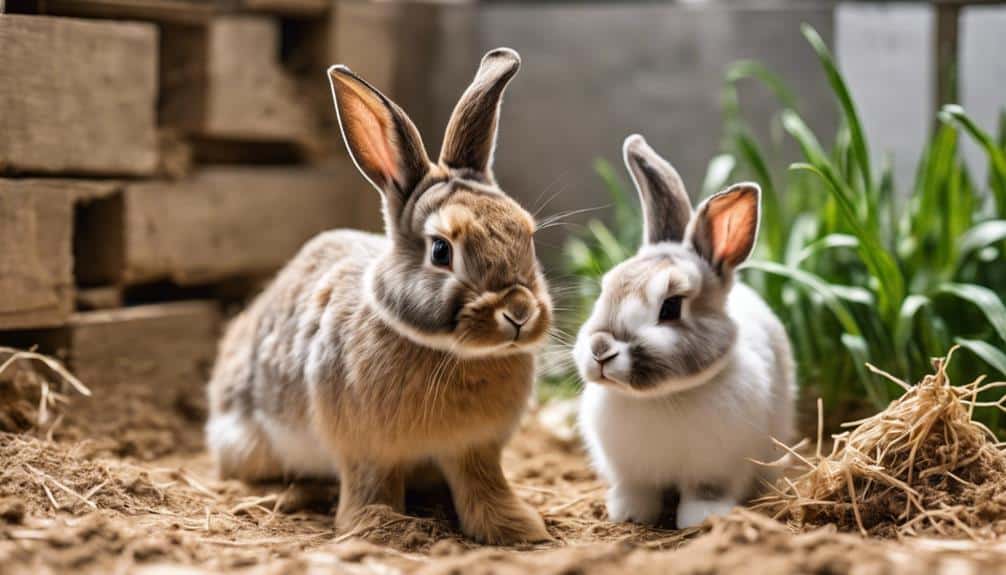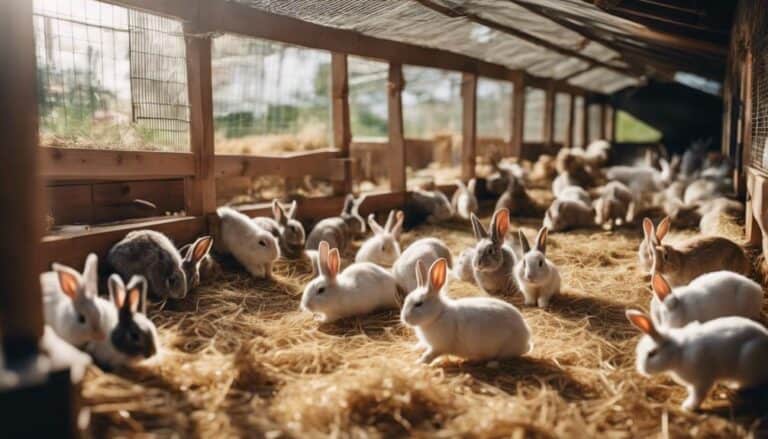When considering the impact of irresponsible bunny breeding, imagine a scenario where unchecked breeding leads to a surplus of rabbits without proper care or homes. The implications of such a situation extend far beyond just the rabbits involved.
Ensuring responsible and ethical practices in bunny breeding is not only about the well-being of the animals but also about upholding standards of compassion and integrity within the community.
By exploring the intricacies of responsible breeding, you can uncover the multifaceted reasons why this ethical approach is significant for the welfare of bunnies and the broader implications it has on society.
Contents
- 1 Key Takeaways
- 2 The Significance of Responsible Bunny Breeding
- 3 Health Benefits of Ethical Bunny Breeding
- 4 Welfare Considerations in Bunny Breeding
- 5 Impacts of Unethical Bunny Breeding
- 6 Breeding Practices and Ethics
- 7 Ensuring Bunny Breeding Responsibility
- 8 The Future of Bunny Breeding
- 9 Frequently Asked Questions
- 10 Conclusion
Key Takeaways
- Safeguards health and well-being of future rabbit generations by preventing genetic disorders and health issues.
- Contributes to preservation of rabbit breeds and genetic diversity, reducing overpopulation in shelters.
- Prioritizes health and happiness of rabbits by minimizing genetic risks and promoting overall well-being.
- Responsible breeding practices ensure industry sustainability, public trust, and a more sustainable environment.
The Significance of Responsible Bunny Breeding

Responsible bunny breeding plays an important role in safeguarding the health and well-being of future rabbit generations. When done by responsible breeders, it helps prevent genetic disorders and health issues that can be passed down to offspring. By prioritizing animal welfare and ethical concerns, these breeders make sure that rabbits are bred in a manner that promotes genetic health and overall well-being.
Moreover, ethical breeding practices contribute to the preservation of rabbit breeds and genetic diversity. This is vital for maintaining the unique characteristics and traits that make each breed special. In addition, responsible breeding plays a significant role in reducing the overpopulation of rabbits in shelters and rescues, as breeders who adhere to ethical standards help control the rabbit population.
Health Benefits of Ethical Bunny Breeding
With ethical bunny breeding, you secure the health and vitality of future rabbit generations by minimizing genetic risks and promoting overall well-being. Genetic diversity resulting from responsible breeding practices helps reduce the incidence of genetic disorders in bunnies.
By avoiding inbreeding, which can lead to weakened immune systems and other health issues, ethical breeding guarantees that rabbits are less susceptible to hereditary conditions. This commitment to maintaining the health and well-being of rabbits through proper care and genetic selection leads to happier and healthier bunnies overall.
The focus on genetic traits and avoiding harmful mutations in ethical breeding practices results in improved quality of life for the rabbits involved. Ultimately, the health benefits of ethical bunny breeding extend beyond individual animals to positively impact the entire population, creating a sustainable and thriving community of rabbits with strong immune systems and robust overall well-being.
Welfare Considerations in Bunny Breeding

Considering the welfare of bunnies in breeding practices involves meticulous attention to their physical and emotional needs. To guarantee the well-being of these furry friends, it's vital to focus on the following:
- Animal Welfare: Prioritize the health and happiness of rabbits through responsible breeding practices that promote their overall welfare.
- Genetic Health: Emphasize the importance of genetic health in bunny breeding to prevent the spread of hereditary diseases and safeguard the long-term well-being of the rabbits.
- Overpopulation Prevention: Responsible breeding practices play a key role in preventing overpopulation, reducing the strain on animal welfare organizations, and promoting responsible pet ownership.
Impacts of Unethical Bunny Breeding
When unethical bunny breeding practices are employed, the health risks and genetic defects that can arise in offspring are numerous and severe. These practices may lead to weakened immune systems, malnutrition, and a host of other health issues that compromise the well-being of the bunnies.
It's essential to understand that the impacts of irresponsible breeding extend far beyond the immediate consequences, often resulting in long-term suffering and health challenges for the animals involved.
Health Risks
Unethical bunny breeding poses significant health risks to rabbits, ranging from weakened immune systems to genetic defects in offspring. When unethical breeding practices are employed, the well-being of animals is compromised, leading to serious health implications. The impacts of such practices include:
- Dental Problems: Improper breeding can result in dental issues, causing pain and difficulty in eating for rabbits.
- Gastrointestinal Issues: Rabbits may suffer from digestive problems due to unethical breeding, affecting their overall health and comfort.
- Pregnancy Complications: Breeding without considering genetic diversity can lead to pregnancy complications and delivery issues, endangering the lives of both the mother and offspring.
It is essential to prioritize ethical breeding practices to safeguard the health and happiness of these beloved animals.
Genetic Defects
Irresponsible breeding practices can lead to genetic defects in rabbits, causing a range of health issues from dental problems to weakened immune systems.
Genetic defects from unethical breeding may result in skeletal deformities, neurological disorders, malocclusion leading to pain and eating difficulties, and head tilt affecting balance. These defects can compromise a rabbit's overall well-being and quality of life.
Additionally, rabbits bred unethically may suffer from weakened immune systems, making them more prone to infections and illnesses. It's important to understand the severe implications of genetic defects resulting from irresponsible breeding and work towards responsible and ethical practices to prevent unnecessary suffering in these vulnerable animals.
Breeding Practices and Ethics

In responsible bunny breeding, prioritizing the health and well-being of rabbits takes precedence over aesthetics or profit. Breeders who practice responsible breeding focus on ethical practices that promote animal welfare and genetic health.
Here are three key aspects to take into account:
- Genetic Health: Responsible breeders prioritize selecting traits that enhance the quality of life for rabbits, making sure they're free from genetic disorders that could impact their well-being.
- Ethical Practices: By avoiding inbreeding and maintaining genetic diversity, breeders uphold ethical standards in bunny breeding. This not only reduces the risk of genetic defects but also promotes a healthier rabbit population overall.
- Rabbit Health: Balancing genetic health with aesthetics is important in ethical bunny breeding practices. Breeders must take into account both the physical well-being and the appearance of the rabbits to make sure they lead healthy and fulfilling lives.
Ensuring Bunny Breeding Responsibility
When ensuring responsible bunny breeding practices, the focus remains on prioritizing the health and well-being of rabbits above all else. Responsible breeding plays an important role in preventing overpopulation and lessening the burden on animal welfare organizations.
By adhering to ethical standards, such as prioritizing the well-being of the rabbits over profit-driven motives, breeders contribute to the overall health of the rabbit population. Additionally, responsible breeding practices help in maintaining genetic diversity and reducing the prevalence of hereditary health issues within rabbit breeds.
Ethical breeders ensure that rabbits receive proper care, socialization, and are placed in suitable environments to promote responsible pet ownership. Ultimately, responsible bunny breeding fosters a more compassionate and sustainable future for rabbits by discouraging irresponsible practices that could harm these animals.
The Future of Bunny Breeding

The future of bunny breeding hinges on conscientious practices that prioritize the well-being and genetic diversity of rabbit populations. Here are three key aspects that will shape a compassionate future for bunny breeding:
- Genetic Diversity: Embracing responsible breeding practices is pivotal for maintaining genetic diversity among rabbit populations. By avoiding inbreeding and promoting diverse gene pools, we can guarantee the long-term health and vitality of different rabbit breeds.
- Animal Welfare: Upholding ethical standards in bunny breeding is essential to safeguard the welfare of these animals. Prioritizing the health and happiness of rabbits over profit ensures a sustainable and compassionate future for the industry.
- Long-Term Health: By focusing on responsible breeding practices, we contribute to the overall well-being and longevity of rabbit breeds. Ensuring that rabbits are bred in a way that preserves their health and vigor is key to securing a bright future for bunny breeding.
Frequently Asked Questions
Why Is Ethical Breeding Important?
Understanding why ethical breeding is important helps you prioritize health concerns, genetic diversity, and population control. By evaluating temperament and following breeding standards, you contribute to responsible ownership while upholding ethical practices that benefit rabbits' welfare.
Is It Ethical to Breed Rabbits?
Breeding rabbits responsibly considers welfare, genetic diversity, and health. It's crucial to control population, avoid inbreeding, and raise awareness. By owning rabbits responsibly, you contribute to a healthier future for these animals.
What Is the Purpose of Breeding Rabbits?
Breeding rabbits serves to improve genetics, increase population, control traits, promote health, enhance breeds, prevent diseases, and guarantee diversity. It is essential for maintaining breed standards and preserving the best qualities of the breed.
What Are the Ethics of Animal Breeding?
When considering the ethics of animal breeding, it's important to prioritize animal welfare, genetic health, breeding standards, and responsible ownership. By following regulations, promoting sustainable practices, and addressing overpopulation concerns, you can contribute positively to animal well-being.
Conclusion
You may think that breeding bunnies is harmless, but irresponsible practices can lead to suffering and overpopulation.
By prioritizing ethical breeding, you can make a positive impact on animal welfare and promote responsible pet ownership.
Remember, every bunny deserves a loving and caring home.
Let's work together to guarantee a compassionate future for these adorable creatures.






